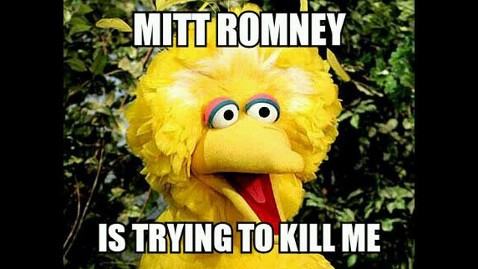Mitt Romney Can't Roast Big Bird With PBS Cuts

Image Credit: Josh Ciesla/Twitter
Twelve hours after the first presidential debate ended, #BigBird was still trending nationwide on Twitter, PBS was still breaking into the worldwide trends, and @BigBird has attracted more than 20,000 followers.
But while the online mania revolved largely around saving Big Bird from Romney's proposal to cut public broadcasting funding, the facts show that Big Bird has little to ruffle his feathers about.
Romney's proposal to zero-out federal spending for public broadcasting will have little to no effect on Sesame Street's budget because the show receives "very, very little funding" from PBS, Sesame Street's executive vice president Sherrie Westin told CNN last week. Westin said the majority of the show's funding comes from corporate sponsorships, product sales and donations.
"Quite frankly, you can debate whether or not there should be funding of public broadcasting. But when they always try to tout out Big Bird, and say we're going to kill Big Bird - that is actually misleading, because Sesame Street will be here," Westin said. "Big Bird lives on."
But while the eight million viewers who tune in to Sesame Street each week can rest assured they'll continue getting their Daily Letter, fans of other PBS programs such as Frontline and Antiques Roadshow may not be so lucky.
About 15 percent of PBS's budget comes from federal funds. But for many rural stations, that percentage is much higher.
"Stations in rural parts of the country, where their parts of the federal funding is 40, 50, 60 percent, those stations will go off the air," PBS chief executive Paula Kerger told CNN this morning. "The reach of our work is so extensive and so deeply rooted in education … the fact that we are in this debate at all is just incomprehensible."
In 2011 the federal government spent about $430 million to support the Corporation for Public Broadcasting, which then divided that money between PBS, NPR and various other stations and programs.
But with enormous pressure on politicians to cut government spending, those funds are on the chopping block, even though the funds for public broadcasting amounted to a mere .00012 percent of the federal budget in 2011. Romney often mentions PBS and NPR as examples of "subsidies" he will eliminate to reduce the deficit. The House Republican budget, championed by his running mate Paul Ryan, also calls for stripping federal funding for public broadcasting.
"I'm going to stop the subsidy to PBS," Romney said at Tuesday night's debate.
"I'm going to stop other things. I like PBS, I love Big Bird. Actually like you, too," Romney continued, referencing debate moderator and host of PBS News Hour Jim Lehrer. "But I'm not going to - I'm not going to keep on spending money on things to borrow money from China to pay for."
It was that comment that sparked an avalanche of jokes, memes, tweets, .gifs, blogs and searches on social media. At a rally in Denver on Thursday morning President Obama quipped about Romney's Big Bird comment.
"Thank goodness someone is finally getting tough on Big Bird," Obama said to laughter from the crowd. "We didn't know that Big Bird was driving the federal deficit. That's what we heard last night."
Big Bird dominated conversation on Facebook, where it was the fourth most-mentioned term of the night behind "Romney," "Obama" and "Debate," according to data released by Facebook.
On Twitter, "Big Bird" generated 17,000 tweets per minute, more than Mitt Romney's speech accepting his nomination at the Republican National Convention or President Obama's 2012 State of the Union address.
And on Google, the Sesame Street character was the fourth highest rising search term of the night, behind "Simpson Bowles," a debt reduction plan mentioned by both candidates, "Dodd Frank," the financial regulatory law that Romney vowed to repeal, and "Who is winning the debate."
See a slideshow of some of the best Big Bird memes HERE.
Big Bird responded to his newfound political stardom Thursday morning, tweeting, "My bed time is usually 7:45, but I was really tired yesterday & fell asleep at 7! Did I miss anything last night?"
According to a statement from Sesame Street, Big Bird is only six years old. The popular children's show would not respond directly to Romney's proposal to cut its public funding.
"We do not comment on campaigns, but we're happy we can all agree that everyone likes Big Bird," Sesame Street said in a statement.